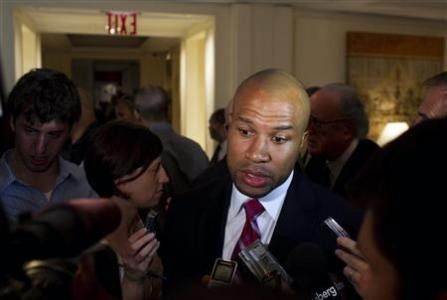NBA Lockout 2011: Decertification Puts Season on the Brink

The NBA Players Association decided to reject the league owners' latest offer and begin the decertification process on Monday in a move that could derail the entire NBA season, according to commissioner David Stern.
NBAPA executive director Billy Hunter told reporters that collective bargaining had failed the players and that the soon-to-be dissolved union would pursue an anti-trust lawsuit against the league. The decision to reject the league owners' offer of a 50-50 BRI split and pursue a lawsuit against the league will create years of litigation and a nuclear winter of the NBA, according to Stern.
Stern strongly criticized Hunter and the players for their decision in an interview on ESPN after the players' announcement, but union president Derek Fisher said it was the best decision for the union.
This is the best decision for the players, union president Derek Fisher said. I want to reiterate that point, that a lot of individual players have a lot of things personally at stake in terms of their careers and where they stand. And right now they feel it's important - we all feel it's important to all our players, not just the ones in this room, but our entire group - that we not only try to get a deal done for today but for the body of NBA players that will come into this league over the next decade and beyond.
The decertification measure was the nuclear option for the players, according to one sports law expert, and could only embolden the owners to push for a worse deal for the players, as Stern has hinted at over the last few weeks.
It could blow up, it could force the owners to call the players' bluff, Gabe Feldman, a law professor and sports law expert at Tulane University, told IBTimes. If there are owners that are willing to miss significant games to change the financial structure of the league, then the owners might say 'We will call your bluff and when the union goes away, then the season goes away.'
The decision to turn down the league's best offer and intend to disband is the ultimate high risk-high reward move. The players have mostly been on the defensive in negotiation with the league's owners and could use it as a way to get a slightly better final offer, even if Stern has claimed that the next offer will be a 53-47 split in the owners' favor. Feldman said it was the players' only opportunity to go on the offensive and try to shake things up.
The players have retained David Boies, who represented the NFL in its anti-trust battle against the NFL players this summer, to handle the decertification process. He previously argued on the NFL's behalf against decertifying in the middle of the negotiation process, but now must justify the players' actions. The process takes about 45 days once the paperwork is officially filed, but the players could still hypothetically negotiate with the owners and agree to a deal, as the NFL players did this summer.
The NFL players union won a few early decisions in its anti-trust fight with the NFL, but ultimately litigation wasn't the main factor in the two sides coming to an agreement, according to Feldman.
It had the potential to shift the leverage more significantly if the players had achieved full success with their lawsuit which they did not, he said. Did it give the players a better deal? Perhaps, but in the end of the day the NFL agreement was reached due to the calendar and not litigation.
Impact of a Lost Season?
The decision to reject the league owners' latest offer and inform the league of its plans to decertify into a trade organization has led for many to proclaim the 2011-12 NBA season as dead. If the players were unwilling to accept a 50-50 split, it's doubtful that they would be willing to accept a 53-47 offer or any other worse offer that the owners can conjure up.
A lost season would be unfortunate though, says lawyer Adam Chase, because of how popular the NBA was last season -- particularly the highly-watched Dallas Mavericks-Miami Heat matchup in the NBA Finals.
I think this lockout is particularly significant because the NBA is coming off of a fantastic season last year, Chase, a sports and entertainment lawyer for Dow Lohnes PLLC, told IBTimes. Ratings were the highest they've ever been since the (Michael) Jordan era. The NBA seems like it (has) developed a stable of likeable, personable stars. That's why the shutdown now really comes at an unfortunate time.
The league has developed its share of likable stars, as Chase suggests, like Dwyane Wade, Dirk Nowitzki, Chris Paul, and more. But also has done a good job in developing those stars' foils, like the Lakers' Kobe Bryant or the Heat's Lebron James -- the players that are the very definition of love or hate.
But even with the apparent resurgence of interest in the NBA, it still typically falls way behind the NFL in revenue and television ratings. It's in part why the NBA lockout has always had a darker outlook -- NBA owners are looking for systematic changes, while NFL owners just wanted a bigger slice of an enormous pile of cash.
It also won't warrant nearly as intense of a reaction as a lost NFL season would among fans, media, and corporate sponsors. Instead, says one economics professor, fans will simply find something else to do.
In terms of our daily lives, it's not a big deal. Dennis Coates, an economics professor at the University of Maryland-Baltimore County, told the IBTimes in an interview earlier this year. (For) hardcore basketball fan this will be something that is missing and you will feel that emotionally, but for most people it won't affect their lives or their income. They will find something else to do.
© Copyright IBTimes 2025. All rights reserved.





















